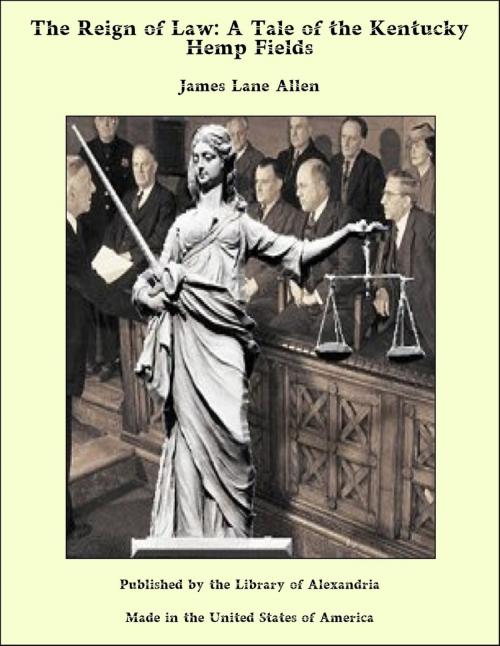The Reign of Law: A Tale of the Kentucky Hemp Fields
Nonfiction, Religion & Spirituality, New Age, History, Fiction & Literature| Author: | James Lane Allen | ISBN: | 9781465606297 |
| Publisher: | Library of Alexandria | Publication: | March 8, 2015 |
| Imprint: | Language: | English |
| Author: | James Lane Allen |
| ISBN: | 9781465606297 |
| Publisher: | Library of Alexandria |
| Publication: | March 8, 2015 |
| Imprint: | |
| Language: | English |
The Anglo-Saxon farmers had scarce conquered foothold, stronghold, freehold in the Western wilderness before they became sowers of hemp—with remembrance of Virginia, with remembrance of dear ancestral Britain. Away back in the days when they lived with wife, child, flock in frontier wooden fortresses and hardly ventured forth for water, salt, game, tillage—in the very summer of that wild daylight ride of Tomlinson and Bell, by comparison with which, my children, the midnight ride of Paul Revere, was as tame as the pitching of a rocking-horse in a boy's nursery—on that history-making twelfth of August, of the year 1782, when these two backwoods riflemen, during that same Revolution the Kentuckians then fighting a branch of that same British army, rushed out of Bryan's Station for the rousing of the settlements and the saving of the West—hemp was growing tall and thick near the walls of the fort. Hemp in Kentucky in 1782—early landmark in the history of the soil, of the people. Cultivated first for the needs of cabin and clearing solely; for twine and rope, towel and table, sheet and shirt. By and by not for cabin and clearing only; not for tow-homespun, fur-clad Kentucky alone. To the north had begun the building of ships, American ships for American commerce, for American arms, for a nation which Nature had herself created and had distinguished as a sea-faring race. To the south had begun the raising of cotton. As the great period of shipbuilding went on—greatest during the twenty years or more ending in 1860; as the great period of cotton-raising and cotton-baling went on—never so great before as that in that same year—the two parts of the nation looked equally to the one border plateau lying between them, to several counties of Kentucky, for most of the nation's hemp. It was in those days of the North that the CONSTITUTION was rigged with Russian hemp on one side, with American hemp on the other, for a patriotic test of the superiority of home-grown, home-prepared fibre; and thanks to the latter, before those days ended with the outbreak of the Civil War, the country had become second to Great Britain alone in her ocean craft, and but little behind that mistress of the seas. So that in response to this double demand for hemp on the American ship and hemp on the southern plantation, at the close of that period of national history on land and sea, from those few counties of Kentucky, in the year 1859, were taken well-nigh forty thousand tons of the well-cleaned bast.
The Anglo-Saxon farmers had scarce conquered foothold, stronghold, freehold in the Western wilderness before they became sowers of hemp—with remembrance of Virginia, with remembrance of dear ancestral Britain. Away back in the days when they lived with wife, child, flock in frontier wooden fortresses and hardly ventured forth for water, salt, game, tillage—in the very summer of that wild daylight ride of Tomlinson and Bell, by comparison with which, my children, the midnight ride of Paul Revere, was as tame as the pitching of a rocking-horse in a boy's nursery—on that history-making twelfth of August, of the year 1782, when these two backwoods riflemen, during that same Revolution the Kentuckians then fighting a branch of that same British army, rushed out of Bryan's Station for the rousing of the settlements and the saving of the West—hemp was growing tall and thick near the walls of the fort. Hemp in Kentucky in 1782—early landmark in the history of the soil, of the people. Cultivated first for the needs of cabin and clearing solely; for twine and rope, towel and table, sheet and shirt. By and by not for cabin and clearing only; not for tow-homespun, fur-clad Kentucky alone. To the north had begun the building of ships, American ships for American commerce, for American arms, for a nation which Nature had herself created and had distinguished as a sea-faring race. To the south had begun the raising of cotton. As the great period of shipbuilding went on—greatest during the twenty years or more ending in 1860; as the great period of cotton-raising and cotton-baling went on—never so great before as that in that same year—the two parts of the nation looked equally to the one border plateau lying between them, to several counties of Kentucky, for most of the nation's hemp. It was in those days of the North that the CONSTITUTION was rigged with Russian hemp on one side, with American hemp on the other, for a patriotic test of the superiority of home-grown, home-prepared fibre; and thanks to the latter, before those days ended with the outbreak of the Civil War, the country had become second to Great Britain alone in her ocean craft, and but little behind that mistress of the seas. So that in response to this double demand for hemp on the American ship and hemp on the southern plantation, at the close of that period of national history on land and sea, from those few counties of Kentucky, in the year 1859, were taken well-nigh forty thousand tons of the well-cleaned bast.















